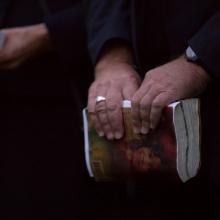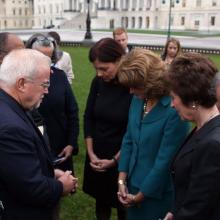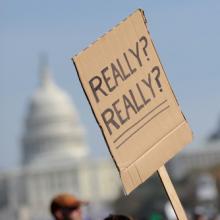government shutdown
Thanks be to God! For all the government workers and their families who will, hopefully, soon get their deeply deserved paychecks, we give thanks. For those of us who are constantly on the look out for what’s next on the breaking news horizon, this is a good place to start today: giving thanks to God. Let us first be thankful, then ask what is next.
Within American culture many have heard the phrase, “as a matter of fact,” utilized in moments of intense debate or discussion. Yet, today the phrase utilized is, “a matter of when?” When will the current trek of looming destruction reach its apex?
Speaking from the White House Rose Garden on Friday, President Trump announced that a deal had been reached to temporarily end the partial government shutdown.
As the federal government shutdown enters a painful second month, the human consequences and costs continue to grow. President Trump’s sham “compromise” over the weekend failed to break the impasse as Democrats continue to hold firm to the principled demand that negotiations over border security take place only after the government is reopened. Today, the Senate is set to vote on this “compromise” as well as a bill that would simply reopen the government for a few weeks to allow serious negotiations without the operations of the government held hostage. The second bill is the one we should urge senators to vote for, though the president and Republican Leader Mitch McConnell are urging Republican senators to vote against it as Trump feels its passage would weaken his negotiating position.
The U.S. Supreme Court temporarily closed the door on President Donald Trump's effort to end protections for hundreds of thousands of undocumented immigrants with the justices again silent on Tuesday on three related appeals.
With the lower court’s ruling against the administration and the high court not yet taking action, the Deferred Action for Childhood Arrivals (DACA) program remains in place for now, essentially maintaining the status quo for current DACA recipients. DACA protects about 700,000 immigrants, often called "Dreamers" based on the name of the Dream Act legislation that failed to pass Congress, from deportation and provides them work permits, though not a path to citizenship.
The longest government shutdown in U.S. history reveals the brokenness of our systems, the danger of a strong man exploiting that brokenness instead of trying to fix it, and the suffering of countless people, always beginning with the most vulnerable. It also painfully shows Washington’s current habit of blaming instead of solving problems, which has left our politics both polarized and paralyzed.
Throughout the week, faith leaders and DACA recipients — young immigrants who were guaranteed protection from deportation under an Obama-era program, since rescinded by President Trump — have urged legislators to refuse a vote on a spending bill to fund the government if it does not include a Dream Act. Trump said he would sign the current version of the bill, up for vote in the House as soon as Thursday evening. That version does not include protections for DACA recipients — a potential make-or-break piece that could force a government shutdown Friday.
For many, including myself, the past few weeks have been discouraging, given the state of our politics and culture and what many vulnerable people across the country are experiencing. But despite the frustration and even grief sometimes I have been reminded of the importance of “saving faith.”
My favorite Twitter response last week said this, “If all American Christians behaved as you do, I wouldn’t have to be such a huge a**hole of an atheist.” (Edits mine.) It came in response to a column I wrote about the new film, 12 Years A Slave (see it if you haven’t yet!), the continuing realities of racism in America that we still tolerate, and the need for churches to provide leadership in the changing demographics of the country by becoming the multiracial faith communities we were intended to be.
The week before saw many of faith leaders, pastors, and young people out in the rain at the U.S. Capitol during the government shutdown in a “Faithful Filibuster,” reading each day through the 2,000 verses in the Bible that speak of how we should treat the poor and vulnerable. One of those nights a family friend, the father of one of the boys I have coached in Little League baseball, came over to our house. He said, “You know I am an atheist, but I really admire what you are doing at the Capitol — that’s what Christians ought to be doing.”
Right after the government shutdown ended, Sojourners had our annual staff orientation. The program included each staff member telling their story of when and why they came to join us. Listening carefully, I was struck by how many Sojourners staffers recalled times in their lives when they were about to lose their faith, but rediscovered it after stumbling upon Sojourners. In my remarks to them that day, I also told stories of a few of the legion of people who have told me over the years of how they had lost or were about to lose their faith until they heard the messages about a faith that does justice.
It has all reminded me again how Sojourners began.
Watching the dysfunction in Washington over the past two weeks has been painful. Our leaders have grown too comfortable with pushing the limits, and we let a few dozen of our own representatives — the people elected to promote the common good, or “general welfare,” as the Constitution calls for— hold the nation's economy hostage for the sake of their political self-interest.
But after the storm comes the promise — the hope of lessons learned and new ways forward together. A few key groups of people have renewed my faith that this is possible.
When I began to read, I started by going through the Psalms. An elderly gentleman paused to listen, and then requested if I could read aloud his favorite, Psalm 91. As I read it, he also began to softly quote the verses by heart, praising God and saying “hallelujah” before thanking me and walking on.
Later, a local pastor from the District Church in Colombia Heights came to read. We met a couple visiting from Louisiana. The wife was a furloughed federal employee with Immigration and Customs Enforcement. It was interesting to hear her point of view working first-hand with immigrants in a deportation capacity. She said as a Christian, it is sometimes very difficult to find a balance between desiring to deport violent criminals, and also wanting to keep hardworking, law-abiding immigrant families together. She and her husband thanked all who were participating in the Faithful Filibuster for keeping Christ present during the government shutdown.
As the next speaker from Salvation Army was reading, several teens participating in a rally at the Supreme Court came to ask about what we were doing. After explaining the filibuster’s mission, a young boy thanked us, shook hands, and said “God bless you.”
During a sunrise vigil at the U.S. Capitol this morning, three senators unexpectedly joined us. They were all women, all Republican and, it turns out, all Catholic. Sens. Susan Collins of Maine, Lisa Murkowski of Alaska, and Kelly Ayotte of New Hampshire are part of a new 14-senator bipartisan, women-led group engaged in their own kind of vigil: trying to end the government shutdown and prevent the nation from going into debt default.
A chuckling comment from a male colleague in the Senate perhaps expresses a hope in the midst of this incredibly dangerous political crisis: “The women are taking over.” This morning, the senators walked over to thank us for praying for them and the government at this critical moment and told us how much they felt the need for our prayers right now. The looks on their faces showed us the seriousness of their plea for prayers.
People of faith are instructed to pray for their political leaders, and their need has never been more evident in this completely dysfunctional Capitol City. For the seventh day now, faith leaders, pastors, young people, and passersby lifted up prayers for the common good across from the Capitol. Until this morning, there was no response from our elected officials or the national media pundits.
But the #FaithfulFilibuster has taken off across the country through word of mouth and social media — our prayers are trending.
People around the country have taken notice of the #FaithfulFilibuster and want to lend their voices. From Pastor Sarah Trone Garriot in Des Moines, Iowa: "Since we couldn't be in Washington to join you, a few of us pastors got together and visited our Iowa Representative's office."
After reading through select Bible verses, the group read the following statement:
To the Honorable Representative Tom Latham:
We believe that the recent government shutdown is not just a failure of the process of governance. This shutdown is born of the failure to follow Jesus’ commandment to “love our neighbor.” (Luke 10:25-37)
We have witnessed hard hearts as our elected representatives squander their time and energy to attack one another and create failure.
We have witnessed our elected representatives acting without mercy when it comes the poor, the vulnerable, the sick, and the stranger.
As Americans, we are at our best when we come together to work for the common good. This shutdown, and the divisive behavior that gave birth to it, is an insult to our nation. We can do better.
[contined at the jump]
I couldn’t believe what I heard. On my television screen a member of Congress quoted the Bible in defense of cutting SNAP benefits. He stated in his testimony, “Scripture says if you don’t work you don’t eat.” The only Scripture that came to my mind as I looked on in sadness was “Jesus wept.”
You see, I had just come from the food pantry my church has operated for more than 20 years. With the economic downturn, our pantry volume has steadily increased from 15 to an average of 40-50 families each day we are open. These families are able to shop with us one time in 30 days, and we attempt to provide three meals a day, for three days, for each member of the household. Our clients are beautiful people who are struggling. Each and every day we hear statements such as, “I never thought I would have to come to a food pantry to feed my family,” or “We just can’t make it to the end of the month.” Our clients come from all walks of life and have one thing in common: they’re struggling.
So, as I listened to the congressman use Scripture to marginalize the very people I care for every day, I felt I needed to do something. I could no longer be silent as the Bible was being used to hurt vulnerable people. I had to speak, and I remembered the Faithful Filibuster. I sent a tweet to Jim Wallis asking if they needed support or extra voices, and he replied that in fact they did. This was a Friday afternoon at 4 p.m., my daughter and I were on the road from Ohio to Washington, D.C., the next morning at 5:30.
We arrived in D.C. at 1:45 just in time to change and walk to the small pulpit labeled #FaithfulFillibuster for our 2:30 time slot. As I stepped onto the grass and began to read, the long hours of the trip began to fade away as the words of the Gospel began to cross my lips. I remember feeling that I would have driven a thousand miles to be able to proclaim the good news of the message of Christ and to speak the Word out loud in a way that comforted God’s people. I would have kept on reading until I couldn’t do it anymore, true filibuster style, all the while looking at the Capitol building with all her power. Our Christian story is one of liberation, new life, abundance, and mercy. It is a story that brings good news to the poor, and I will tell it until I no longer have breath.
"They pass their days on earth, but they are citizens of heaven. They obey the prescribed laws, and at the same time surpass the laws by their lives."
The above is from a second-century letter to a Roman official has been making the rounds again. It’s been critiqued and analyzed by theologians and pastors alike. Suddenly relevant, the letter to Diognetus is an apologetic, an explanation if you will, of what it meant in the eyes of one writer to be a Christian in that day.
The letter is also an attempt to explain what it means for a Christian to be a citizen of an empire. The author wrote of loyalty, perseverance, and faithfulness, of what it means to be a citizen of heaven above and beyond any other citizenship.
It’s an uncommon rhetoric in our day, to be certain.
A curious early document, the author does not point to scripture as an authority. It’s too soon for epistles and canons. Still, I cannot help but wonder if Jeremiah’s words weren’t somehow in the mix, if the story of Jesus and the ten lepers weren’t in there too.
Heal society’s castoffs and then compel that same society to make peace with those they shun.
Work for the welfare of the place you live no matter what that place may be.
The letter reflects this venerable wisdom.
Setting an away email with no date of return was almost as odd as leaving work and not and knowing when I’d be back. This unexpected time off gave me the opportunity to do everything on my to-do list and spend ridiculous amounts of time at the dog park. Naturally, it also gave me time to catch up on reading and visiting with other furloughed friends. But this past Wednesday I was beginning to feel a bit hopeless about the whole situation.
Scrolling through Facebook I noticed Sojourners updates on its #FaithfulFilibuster and it truly made me ashamed of my hopelessness. I was ashamed because I forgot who was in charge. I was ashamed because I forgot where my hope lies. And I was ashamed because I was so wrapped up in my own struggles of furlough I forgot about the families that were already struggling and now also dealing with a loss of paychecks.
On Thursday I saw another update from Sojourners, and despite the rain, I felt compelled to go check it out. I expected to do nothing but observe and admire faith leaders stepping out to reclaim hope and speak for the millions of silenced voices in this country. However, when I arrived, something different happened. I was asked if I wanted to participate, handed a Bible, and stepped to the podium to read.
Jim Wallis talks about the #FaithfulFilibuster outside the Capitol Building and offers a reading of his conversion text, Matthew 25.
I was talking to my wife, Amy, today about the news that Speaker John Boehner has requested movement from his party toward a temporary increase of the United States government debt ceiling.
The shutdown in itself is problematic enough. Our leaders have willfully put about a million people out of work while they haggle about policy that has already been put into law. The cost of their standoff to the United States economy is a loss of about $1.6 billion a week in economic output. And it’s more than a little bit ironic that this is being done on the watch of a Congress that supposedly has its first priority as jobs and economic growth.
However, all of this pales in comparison to the potential damage that would ripple throughout the global economy if we were to default on our debt. Because so many markets in the world peg their valuation system to the American dollar, and because so many exchanges use our currency as their monetary system, the prospect of the credibility of our money losing its footing in a potentially irreparable way could be nothing short of catastrophic worldwide.
“We should just fire them all," said Amy. “Just clean house and start fresh.”
The thing is, although this is a sentiment I hear on nearly a daily basis, and I've heard it over the course of many years, very little of substance seems to change when it comes to who represents us in Washington, D.C.
Editor's Note: Not in D.C., but want to join in the #FaithfulFilibuster? Click HERE to make your voice heard, and spread the word on Facebook by sharing HERE.
On our way over to the Capitol, I re-read the story of the Tower of Babel in Genesis 11. I was struck by the phrase of those building the tall tower "we'll become famous." That sounded a lot like lawmakers and politicians in Washington — it seems that they all want to become famous. In the story, the people were confounded by speaking different languages and their words went past each other. The words of the politicians and pundits are going past each other and their words are not really meant to be understood. They're not meant to find solutions or common ground. These are words that are meant to fight. To win. To defeat. Even, it seems, to foster hate.
The words we're hearing are of politics and punditry, meant to divide and not to unite. The words coming from the top have consequences for those at the bottom. And like Babel, these words are just babble.
We're hearing lots of babble at the Capitol, but across the street, we're trying to hear the word of God — what God says about the people, families, and children who will suffer the most because of Washington's babble. These words aren't just directed to churches and charities about what we should do with the poor. They're about the obligations of kings, rulers, and government to protect the poor.
During the government shutdown, some cuts have caught the public’s attention more than others. And some people are rejoicing over the cuts faced by the Environmental Protection Agency and other environmental agencies. But the shutdown of our environmental programs is affecting people’s lives in ways that might surprise you.
1. National Parks closures are more than an inconvenience
In some National Parks across the country, employees are stranded. Employees who live on park grounds, like park rangers and concession workers, have no work or pay, and because the parks are closed, they’re not even allowed to take solace in the trails that surround them. And in at least one case, they don’t have any food. About 2,200 employees – 1,800 of them concession workers – are stranded in Grand Canyon National Park. A local food bank has started making deliveries, because those people are going hungry and without pay.
Thursday marked the tenth day of the government shutdown and the second of the #FaithfulFilibuster — A Vigil for the Poor. People of faith, both across the street from the Capitol Building and across the world on social media, are reading through the more than 2,000 Bible verses that deal with poverty and justice as a witness for those the shutdown is affecting the most.
The rain didn't deter the prayers, as leaders from Sojourners, Bread for the World, the National Association of Evangelicals, the Salvation Army, and more gathered once again to call on Congress to end the shutdown and stop hurting the poor.
They are asking people of faith to reach out to Congressional leadership. Join along with them to Tweet at those members of Congress with your message to them and hashtag #FaithfulFilibuster.



















